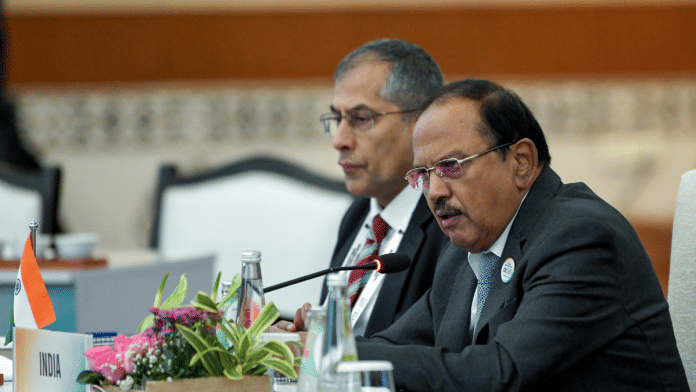New Delhi: Strengthening regional partnerships has gained “immense significance today” due to the “rapidly changing and challenging global security environment”, National Security Adviser Ajit Doval said Thursday in his opening remarks to the Colombo Security Conclave (CSC) NSA-level meeting.
“The CSC has gained immense significance today in the midst of a rapidly changing and challenging global security environment. Realising the growing importance of strengthening regional partnership amongst the countries of the Indian Ocean region, we came together in 2020 to reinforce the cooperation in vital matters of security through the establishment of Colombo Security Conclave,” Doval said.
The CSC is a regional organisation focusing on areas such as maritime security and safety, countering terrorism, combating transnational organised crime and protection of critical infrastructure and humanitarian assistance and disaster relief.
Apart from India, Maldives, Mauritius, Sri Lanka and Bangladesh are members of the CSC. Seychelles attended the Thursday meeting as an observer, while Malaysia was invited as a guest.
Doval called for shaping up a favourable environment to nurture an open, inclusive maritime domain and conformably on a rule-based order.
“We also need to work closely for the preservation and use of our common maritime heritage. India is committed to continue working closely with all CSC countries to enhance our collective capacities in dealing with evolving and emerging security challenges,” he said.
The CSC member-states signed the founding documents of the organisation last year in Colombo. The NSAs last met in Mauritius in December 2023. Since then the member-states have gone through a sea of change.
Bangladesh’s NSA Khalilur Rahman attended the meeting, marking only the second senior official from the interim government in Dhaka travelling to India since Sheikh Hasina’s ouster in August 2024. Bangladesh energy adviser Muhammad Fauzul Kabir Khan attended India Energy Week in February.
Rahman arrived a day ahead of schedule and held a bilateral meeting with Doval Wednesday.
Ties between New Delhi and Dhaka have soured since Hasina’s ouster last year. The former Bangladesh prime minister was sentenced to death for ‘crimes against humanity’ Monday for the actions of her regime in suppressing the student demonstrators last year. Hasina fled Dhaka for New Delhi and remains in India.
The CSC has sought to formalise the grouping in the last year. It originally became a trilateral meeting on maritime cooperation among India, Sri Lanka and Maldives.
The organisation expanded to include Mauritius in 2020 and took form as the CSC. Mauritius formally joined the CSC in 2022. Bangladesh joined in 2024. Seychelles has agreed to join the CSC as a full member Thursday. Earlier this year, the CSC appointed its first secretary-general as a part of the formalising process of the organisation.
“The ocean is our biggest heritage. It is the engine that propels our economies. As countries joined by shared maritime geographies, it is our responsibility to ensure the safety, security and stability of the region,” Doval said.
The seventh-NSA level meeting was originally scheduled to be held by India in 2024. However, it was rescheduled for 20 November, 2025. In recent years, India has sought to rejig diplomatic participation in organisations focusing on maritime security.
Alongside the CSC, India is also a member of the Bay of Bengal Initiative for Multi-Sectoral Technical and Economic Cooperation (BIMSTEC) – an organisation consisting of seven members focused on the countries located on the Bay of Bengal (apart from Nepal and Bhutan, which are both landlocked). Bangladesh is the current chair of BIMSTEC, taking over the role from Thailand at the summit held in April.
Similarly, India has looked to strengthen the Quad, with the US, Australia and Japan as members. The Quad has focused on strengthening the partnership across the Indo-Pacific. However, the next leaders’ summit, which is to be hosted by India, is yet to take place.
(Edited by Tony Rai)
Also Read: Building on Muttaqi’s visit, Taliban commerce minister in India amid tensions with Pakistan






